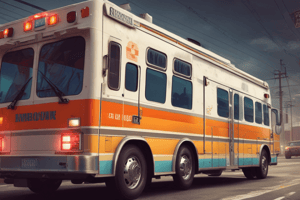Podcast
Questions and Answers
What is the primary role of an emergency medical responder (EMR) during an emergency?
What is the primary role of an emergency medical responder (EMR) during an emergency?
- To transport the patient to the hospital
- To provide advanced surgical procedures on site
- To be the first medically trained person on scene (correct)
- To lead the coordination of the entire EMS system
Why was the EMS system developed?
Why was the EMS system developed?
- To limit the role of EMRs to first aid only
- To improve the coordination among emergency services
- To improve patient outcomes in emergencies (correct)
- To increase the number of hospitals available
What is a frequent source of emergency calls in modern settings?
What is a frequent source of emergency calls in modern settings?
- Cellular phones (correct)
- Public emergency call systems
- Satellite phones
- Emergency flares
What is a significant challenge during EMS operations?
What is a significant challenge during EMS operations?
How do Enhanced 9-1-1 centers improve emergency response?
How do Enhanced 9-1-1 centers improve emergency response?
What first action does an individual take when recognizing an emergency?
What first action does an individual take when recognizing an emergency?
Which of the following is true about the agencies providing EMS?
Which of the following is true about the agencies providing EMS?
What is essential for an EMS system to operate smoothly?
What is essential for an EMS system to operate smoothly?
What is the primary reason for an EMR's importance in the early minutes after a crash?
What is the primary reason for an EMR's importance in the early minutes after a crash?
Why is it essential to understand how the components of the EMS system work?
Why is it essential to understand how the components of the EMS system work?
How does effective interaction between different levels of the EMS team contribute to quality of care?
How does effective interaction between different levels of the EMS team contribute to quality of care?
Which of the following statements about the EMS response is accurate?
Which of the following statements about the EMS response is accurate?
What role do firefighters and law enforcement personnel play in emergency medical responses?
What role do firefighters and law enforcement personnel play in emergency medical responses?
What does a basic life support (BLS) unit typically consist of?
What does a basic life support (BLS) unit typically consist of?
What is a key factor for survival in cases of cardiac arrest?
What is a key factor for survival in cases of cardiac arrest?
What is the typical training requirement for an EMT?
What is the typical training requirement for an EMT?
Flashcards are hidden until you start studying
Study Notes
Emergency Medical Responder (EMR) Overview
- EMRs are often the first medically trained individuals to respond to emergencies, providing critical care that can be life-saving.
- Care provided by EMRs is typically followed by Emergency Medical Technicians (EMTs), paramedics, and other healthcare professionals.
EMS System Importance
- The EMS system aims to improve patient outcomes, demonstrating that early emergency medical care enhances survival rates for injuries and illnesses.
- Understanding the EMS system's operation is crucial due to its complexity and the collaboration between various personnel and agencies.
Coordination and Communication
- Problems in EMS operations often stem from poor coordination among agencies and personnel.
- Successful EMS operations rely on shared understanding of roles, which is fostered through cooperation, communication, and comprehensive planning.
Emergency Reporting Process
- The initial step in an emergency is recognizing the situation and calling for help, often conducted via cellular or landline phones, or two-way radios.
- Emergency response communications centers (PSAPs) typically handle these calls, which may include various emergency services like fire, police, or EMS.
Dispatch Mechanism
- When notified of an incident, emergency response centers dispatch appropriate personnel and equipment using various communication means, including phones and radios.
- The resources available for EMS response may differ significantly between communities.
First Response
- Firefighters and law enforcement often serve as first EMRs due to their training and location advantages.
- Communities may have numerous EMRs but fewer EMTs and paramedics, affecting response dynamics.
Critical Moments in Care
- The initial contact with the EMS system can significantly impact patient outcomes, particularly in conditions like cardiac arrest, where time to treatment is crucial.
- Manual CPR initiation is vital, highlighting the importance of immediate action from EMRs.
EMS Vehicle Response
- Following the EMR's initial assessment, an ambulance staff of EMTs or paramedics is often the second point of contact for the patient.
- Basic Life Support (BLS) units are comprised of properly equipped vehicles and trained EMTs, who have completed extensive training programs.
Studying That Suits You
Use AI to generate personalized quizzes and flashcards to suit your learning preferences.




